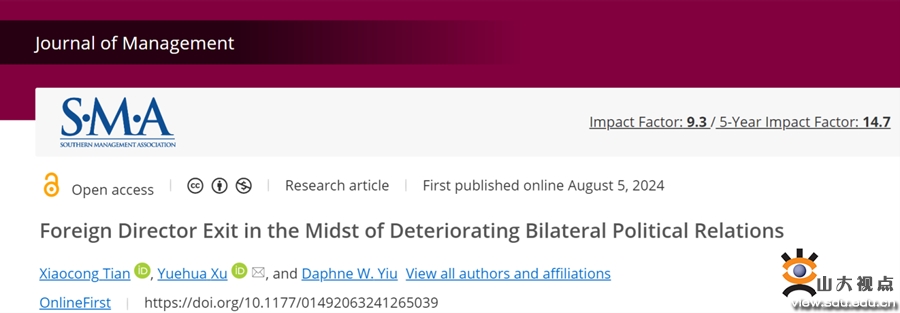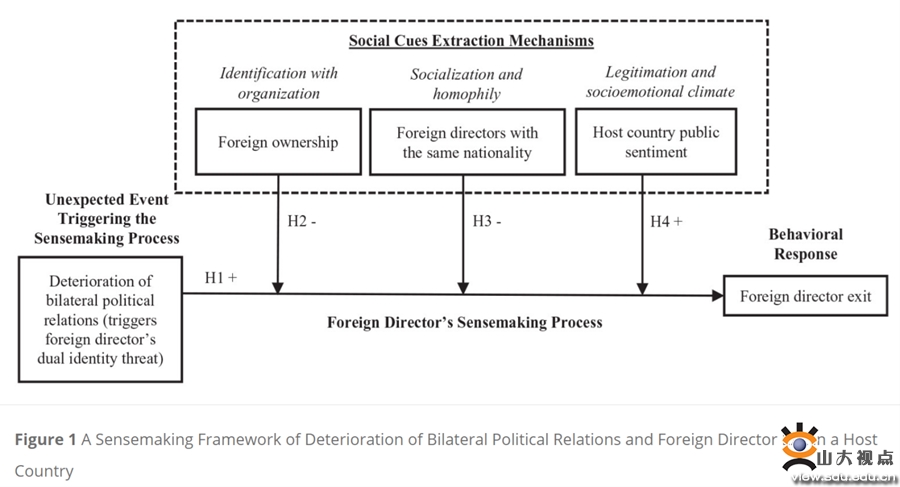Recently, Associate Professor Tian Xiaocong and Professor Xu Yuehua from the Department of Strategy Innovation and Entrepreneurship of the School of Management have published their latest research findings titled“Foreign Director Exit in the Midst of Deteriorating Bilateral Political Relations”online in the Journal of Management, an international academic journal. The journal ranks third in the field of management and first in applied psychology. Moreover, it is listed by Financial Times as one of the 50 most influential academic business journals in the world (FT 50), and is an ABS 4-star journal with a five-year impact factor of 14.7. Tian is the first author of the paper, while Xu serves as the second author and corresponding author. Shandong University is both the first author affiliation and corresponding author affiliation. The research was supported by the National Natural Science Foundation of China.

The paper drew academic attention to the underexamined phenomenon of the exit of foreign directors from their host countries during geopolitical tensions. Based on sensemaking logic, the paper argued that the deterioration of bilateral political relations serves as an unexpected event that activates foreign directors’ schemas for dual identity conflict, propelling them to react behaviorally to such identity threats by exiting the board in the host country. In addition, the paper further posited that the sensemaking process is contingent on how the foreign director draws cues from the embedded social context, including organizational identification, socialization and homophily effect, and socioemotional climate.

The escalating geopolitical tensions have placed immense pressure on companies and individuals located abroad. Conducting frontier exploration, the paper theorized the micro and macro links between changes in the geopolitical environment and the social cognitive evaluation of foreign actors in a host country, thus extending the literature of country-level geopolitical relations to individual-level outcomes. What’s more, prior international business scholars have paid considerable attention to the legitimacy pressures multinational enterprises face in host countries and the strategic responses multinational enterprises choose to mitigate the liability of foreignness. The paper enriched the understanding of the impact of geopolitics on foreign talent outflow and corporate governance effectiveness in the host country by highlighting the dual identity of foreign directors. Regarding sensemaking theory, the paper highlighted how unforeseen macro-level events can trigger sensemaking among foreign individual actors with dual identities by inducing identity conflicts and threats. It broadened the understanding of how geopolitical tensions prompt sensemaking and revealed how the social contextual cognition of foreign directors in host countries is shaped by the alignment between personal and organizational identities, the homogeneity effects arising from social interactions, and the socio-emotional support provided by the host country.
Tian Xiaocong is an associate professor in the School of Management, Shandong University. Her main research interests include international business, corporate governance and other areas. She has presided over and participated in multiple programs of the National Natural Science Foundation of China, and her research results have been published in the Academy of Management Journal, Journal of International Business Studies, Journal of World Business, International Business Review and other high-level international journals. Besides, she has participated in numerous international academic conferences and has been nominated for the Peter J. Buckley and Mark Casson AIB Dissertation Award. She serves as an anonymous reviewer for international academic journals such as Journal of Management Studies, Journal of World Business, and International Business Review.
Xu Yuehua is a professor and doctoral supervisor at the School of Management, Shandong University. She is also a Qilu Young Scholar, leader of a Youth Innovation Team supported by the Department of Education of Shandong Province, and chief expert of a Key Program supported by the National Social Science Fund of China. Her main research areas include governance mechanisms with Chinese characteristics, corporate social responsibility, strategic leadership, and rural enterprises. She is currently leading and participating in a number of national programs, including one supported by the National Natural Science Foundation of China, which was recognized as “Excellent”. Her research achievements have been published in top international and domestic academic journals including Management World, Organization Science, Strategic Management Journal, Journal of Management, and Journal of Business Ethics. Additionally, she serves as a member of the editorial board of Asia Pacific Journal of Management and Management and Organization Review. The teaching cases she led and participated in have won the “2018 China Business Administration International Best Case Award Nomination”and the “2021 National 100 Best Cases”. She also serves as a review expert for the National Social Science Fund of China, the National Natural Science Foundation of China, and the Master's and Doctoral Dissertation Evaluation Center of the Ministry of Education.